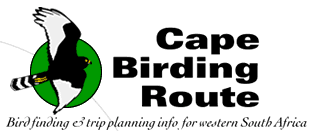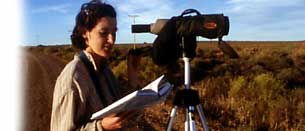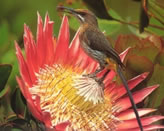Leaving
Cape Town: Waterbirds and Rietvlei
The
main arterial road running up most of the western shoreline
is the R27, which can be reached from the N1 national road
just north of Cape Town. It begins in the coastal suburb of
Milnerton, where it is initially known as Otto Du Plessis
Drive. As you pass through Milnerton, scan the lagoon that
lies between the R27 and the conspicuous Woodbridge Island
lighthouse on your left. A number of widespread waterbird
species are often found here, most notably Little Egret,
Grey-headed Gull (uncommon), Caspian and
Swift Terns, and Pied Kingfisher.
Continuing
a few kilometres further north, the road swings to the left.
Here, a number of large waterbodies are visible on your right.
Initially, the non-perennial pan of Rietvlei (dry and dusty
in late summer) can be seen in the distance. During the winter
and spring, the pan supports an excellent diversity and abundance
of waterbirds, and these can be viewed from the bird hide
on the opposite side of the pan (see below for directions).
Birders visiting at the right time of year and with time to
spare will find a visit to Rietvlei rewarding. However, most
of its birds are more conveniently found elsewhere on this
route. Continuing along the R27, the deep waters of Flamingo
Vlei come into view on your right after a short while. This
lake is used mainly for watersports and birdlife is less diverse,
although White Pelican and Darter can often
be seen here.
At
the third set of traffic lights beyond the lighthouse (after
6.4 km), there is a series of pans surrounding the road: one
lies to the left (Pan 1), another to the right (Pan 2), and
one to the left beyond the traffic lights (Pan 3). These ‘Dolphin
Beach’ pans can be birded from the roadside, and support
a remarkable diversity of waterbird species, including Dabchick,
Yellow-billed Egret, Glossy Ibis, Cape Shoveller,
Yellow-billed Duck, Red-knobbed Coot, Moorhen,
Purple Gallinule, Ethiopian Snipe, Three-banded
Plover, Black-winged Stilt, and in summer, Little
Stint, Wood Sandpiper, Ruff and White-winged
Tern. The localized White-backed Duck is invariably
present on Pan 3. The scarce and very local Painted Snipe
is also occasionally found here, especially in the grassy
edges of Pan 1. Scan the reedbeds for Cape Reed Warbler,
and the vegetation along the edges of the pans for the conspicuous
Levaillant’s Cisticola and Common Waxbill.
Brown-throated Martin and White-throated Swallow
hawk insects overhead, and African Marsh Harrier can
often be seen over the reedbeds.
To
enjoy panoramic frontal views of Table Mountain, turn left
at the traffic lights towards Bloubergstrand. Check the rocks
along the beach here for Crowned Cormorant and African
Black Oystercatcher (p.32*).
Returning
to the R27, continue northwards. Should you wish to visit
Rietvlei, turn right at the first set of traffic lights (after
0.7 km) beyond the roadside pans, take first right again (Pentz
Drive) and continue for just over a kilometre until you reach
the SANCCOB seabird rehabilitation centre on your right. This
very worthwhile organization deserves a quick visit as there
are always recovering seabirds on site (see p.32). From SANCCOB,
turn right at the first four-way stop and inquire at the Aquatic
Club for access to the bird hide. There is a 15 minute walk
to the hide, and a small fee is payable.
|


